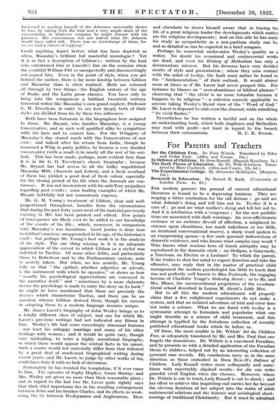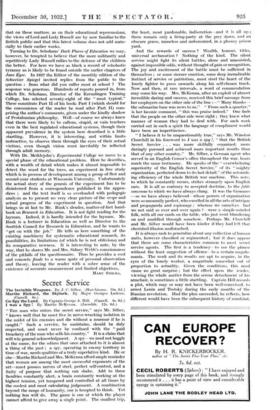For Parents and Teachers
Set the Children Free. By Fritz Wittels. Translated by Eder and Cedar Paul. (Allen and Unwin. 10s.) The Experimental College. By Alexander Meiklejohn. (Harpers. 15s.)
Fon modern parents the perusal of current educational literature is bound to be a depressing business. They are reaping a bitter retribution for the old dictum : go and see what Johnnie's doing and tell him not to. To-day it is a case of : go and see what mother's doing and tell her not to. And it is retribution with a vengeance ; for the new prohibi- tions are associated with dark warnings. An over-affectionate embrace or an embrace devoid of affection, a misplaced in- sistence upon cleanliness, too much nakedness or too little, an irrational conversational reserve, a sharp word spoken to an exasperating spouse—a few such ignorant indiscretions of domestic existence, and who knows what complex may result ? Who knows what noxious hero of Greek antiquity may be reproduced in the domestic circle : an Oedipus, a Ganymede, a Narcissus, an Electra or a Lesbian? To which the parent, if she wishes to shut her mind to expert direction and take the offensive, may reply that in the matter of practical child management the modern psychologist has little to teach that was not perfectly well known to Miss Fosbrook, the engaging heroine of Charlotte Yonge's Stokesley Secret ; or to Mr. and Mrs. Bhaer, the unconventional proprietors of the co-educa- tional school described in Louisa M. Alcott's Little Men.
But to all this the modern educationist will properly claim that a few enlightened experiments do not make- a system, and that an isolated adventure of trial and error does not make a science. What we are faced with to-day is a systematic attempt to formulate and popularize what one might describe as a science of child treatment, and this attempt is typified by the fortuitous collection of recently published educational books which lie before us.
Of these, the most erudite is Dr. Wittels' Set the Children Free, so adequately translated by Mr. and Mrs. Paul that one forgets the translators. Dr. Wittels is a convinced Freudian, and he presents us with a detailed application of the Freudian thesis to children, helped out by an interesting collection of personal case records. His conclusions carry us in the same direction as those embodied in Dora R1:832ll'S Defence of Children. Lady Russell writes more colloquially and some- times with regrettably slipshod results—for she can write graceful vivid English when she chooses. Moreover, where Dr. Wittels is out to teach, Lady Russell is out to shock ; and her effort to achieve this inspiriting end carries her far beyond the obvious frontiers of her subject into the realm of adult matrimonial relations and the historic and sociological short- comings of traditional Christianity. But it must be admitted
that on these matters, as On their educational repercussions, the views of Lord and Lady Russell are by now familiar to the British public and that this latest volume does not add mate- rially to their earlier works.
Turning to Dr. Schohaus' Dark Places of Education we may, however, be tempted to believe that the more militantly and repetitively Lady Russell rallies to the defence of the children the better. For here we have as black a record of scholastic tyranny as is likely to be found outside the earlier chapters of Jane Eyre. In 1927 the Editor of the monthly edition of the Schweizer Spiegel invited replies from the public to the question : from what did you suffer most at school ? The response was generous. Hundreds of reports poured in, from which Dr. Schohaus, Director of the Kreuzlingen Training College, has selected seventy-eight of the " most typical." These constitute Part II of his book; Part I (which should for the convenience of the reader be read after Part II) com- prising the author's comments, given under the kindly shadow of Pestalozzian philosophy. Well—of course we always knew that there were likely to be callous, stupid, or vain teachers even in the best regulated educational systems, though their apparent prevalence in the system here described is a little startling. However, it is interesting, and within limits instructive, to observe them through the eyes of their actual victims, even though vision must inevitably be reflected through adult memory.
With Dr. Meiklejohn's Experimental College we move to a special phase of the educational problem. Here he describes, with a wealth of detail which makes it almost impossible to detect the wood for the trees, an experiment in free study which is in process of development among a group of first and second-year students at Wisconsin University. Unfortunately the actual story of the genesis of the experiment has to be disinterred from a correspondence published in the appen- dices ; and the text itself is so overloaded with pedagogic analysis as to present no very clear picture of the scope and actual progress of the experiment in question. And that brings us at last to Mr. Rusk's slender, matter-of-fact hand- book on Research in Education. It is not light reading for the layman. Indeed, it is hardly intended for the layman. Mr. Rusk is a lecturer in Education as well as Director to the Scottish Council for Research in Education, and he wants to "get on with the job." He tells us here something of the existing machinery for systematic educational research, its possibilities, its limitations (of which he is not oblivious) and its comparative newness. It is interesting to note, by the way, that he shares Mr. and Mrs. Sidney Webb's consciousness of the pitfalls of the questionnaire. Thus he provides a cool and concrete finale to a warm spate of personal observation and theory, leaving the reader with a sober sense of the existence of accurate measurement and limited objectives.
MARY STOCKS.































 Previous page
Previous page